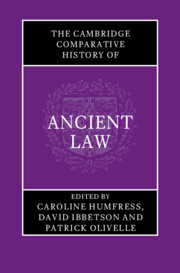Book contents
- The Cambridge Comparative History of Ancient Law
- The Cambridge Comparative History of Ancient Law
- Copyright page
- Contents
- Figures
- Maps
- Contributors
- Preface
- Additional material
- Additional material
- Abbreviations
- Maps
- 1 Orientation
- 2 Law as Text
- 3 Legal Science
- 4 War, Peace and Interstate Relations
- 5 Law and the State
- 6 Law and Religion
- 7 Legal Procedure
- 8 Status and Family
- 9 Crime, Redress and Social Control
- 10 Property
- 11 Commerce and Contracts
- 12 Conclusion
- Bibliography
- Index
12 - Conclusion
Published online by Cambridge University Press: 09 May 2024
- The Cambridge Comparative History of Ancient Law
- The Cambridge Comparative History of Ancient Law
- Copyright page
- Contents
- Figures
- Maps
- Contributors
- Preface
- Additional material
- Additional material
- Abbreviations
- Maps
- 1 Orientation
- 2 Law as Text
- 3 Legal Science
- 4 War, Peace and Interstate Relations
- 5 Law and the State
- 6 Law and Religion
- 7 Legal Procedure
- 8 Status and Family
- 9 Crime, Redress and Social Control
- 10 Property
- 11 Commerce and Contracts
- 12 Conclusion
- Bibliography
- Index
Summary
Chapter 12 concludes the Cambridge Comparative History of Ancient Law by drawing out a set of fundamental comparisons, both differences and similarities, from the volume’s previous chapters, in addition to offering further reflections on the field of ‘ancient law’ itself. The chapter opens by comparing and contrasting the Cambridge Comparative History of Ancient Law to earlier historiography, underscoring its unique contribution to existing scholarship: developed through collaborative work and drawing upon numerous specialist traditions and technical expertise, across a pan-Eurasian research field. The chapter then moves on to a broader discussion of ‘Mapping the Ancient Legal Cosmos’ and ‘Ordering Ancient Associations’, pinpointing the specific connections between ethics, law and statecraft that can be observed across the ancient source material. The chapter concludes by suggesting several answers to a provocative, but fundamental, question: What is ‘Ancient’ about ‘Ancient Law’?.
- Type
- Chapter
- Information
- The Cambridge Comparative History of Ancient Law , pp. 598 - 614Publisher: Cambridge University PressPrint publication year: 2024

